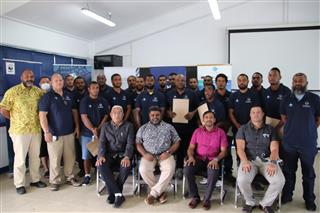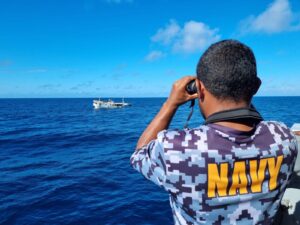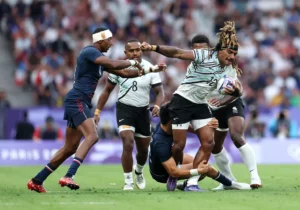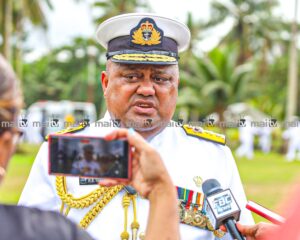Twenty-eight students graduated from Fiji National University’s Maritime Academy (FMA) Deck Hand Fishing Programme today, not only qualifying as deckhands on board a fishing vessel but also becoming part of an ocean sustainability initiative.
The students took part in a one-month intense theory and hands-on training course on basic sea safety, nautical and by-catch knowledge.
The by-catch component of the course aims to streamline sustainable fishing practices and applications to upscale the fisheries workforce’s knowledge of sustainable practices.
Today’s cohort of graduates were scholarship recipients funded through the By-catch and Integrated Ecosystem Management (BIEM) Initiative of the EU and the Government of Sweden-funded Pacific[1]European Union Marine Partnership (PEUMP) programme under the project partnership of FMA, Worldwide Fund for Nature (WWF) and the Secretariat of the Pacific Regional Environment Programme (SPREP).
FMA Chief Executive Officer, Captain Rajitha Semage highlighted that the graduates will add significant value to the fishing vessels workforce as they are well-equipped to handle the challenging requirements of modern-day fishing vessels.
WWF-Pacific’s Sustainable Fisheries and Seafood Programme Manager, Duncan Williams said, “The scholarships have given the 28 students that serve in Fiji’s offshore fishing sector the opportunity to better understand issues such as by-catch of protected species of sharks and turtles and gain the skills and best practices to help mitigate the detrimental impacts of fishing to the wider marine ecosystem. The programme also provided greater awareness of safety while at sea, but unique to Fiji is the addition of a module in the curriculum devoted to by-catch mitigation that WWF helped to develop with FMA, emphasizing Fiji’s commitment to a sustainable fishing industry that acknowledges environmental concerns on by-catch.”
The term “by-catch” refers to the unintentional catch of non-targeted organisms while fishing for a particular species.
A report by FAO in 2019 estimated that around 9.1 million tonnes of fish are discarded annually in the global marine capture fisheries, representing 10.8 per cent of the annual average catch from 2010 – 2014.
Jamie Davies, BIEM Initiative Manager at SPREP added his support for the initiative. “Sharks, turtles, seabirds and whales and dolphins are known as ‘keystone species’ and play a vital role in maintaining the health of the Pacific Ocean,” said Mr Davies.
“Without them marine ecosystems don’t function effectively, and the valuable tuna fisheries Fiji and other Pacific countries rely on would not exist. By-catch in tuna longline fisheries is one of the numerous threats facing these species and we are very pleased to be supporting this initiative to ensure that crew members are informed on the measures in place to protect them and safely release them back to the ocean when caught.”
SPREP is leading Key Result Area 5 of the PEUMP programme, the BIEM Initiative, to support the governments of Fiji, Papua New Guinea, Solomon Islands, Tonga and Vanuatu in the sustainable management of coastal and marine biodiversity.
The BIEM Initiative consists of eight integrated areas consisting of marine spatial planning; integrated ‘ridge to reef’ ecosystem strategies and coastal zone management planning; development and integration of climate change adaptation strategies into coastal community plans; assessment of bycatch of endangered species and extinction risk; development and implementation of bycatch mitigation strategies; capacity development through research grants to citizens of Pacific island countries; support for community monitoring and protection of endangered species; and capacity development of Non-Detrimental Findings process for CITES partners. Human rights and gender equality will be at the core of the development and implementation of each of these components.









